Book contents
- Southern Black Women and Their Struggle for Freedom during the Civil War and Reconstruction
- Southern Black Women and Their Struggle for Freedom during the Civil War and Reconstruction
- Copyright page
- Dedication
- Contents
- Figures
- Tables
- Contributors
- Acknowledgments
- Introduction
- Part I Emancipation and Black Women’s Labor
- Part II War, Gender Violence, and the Courts
- Part III Emancipation, the Black Family, and Education
- 7 Making Their Place on the South’s Ragged Edge
- 8 Black Women’s Lives and Labors in Post-Emancipation North Carolina
- 9 Remaking Old Blue College
- Notes
- Index
8 - Black Women’s Lives and Labors in Post-Emancipation North Carolina
from Part III - Emancipation, the Black Family, and Education
Published online by Cambridge University Press: 14 December 2023
- Southern Black Women and Their Struggle for Freedom during the Civil War and Reconstruction
- Southern Black Women and Their Struggle for Freedom during the Civil War and Reconstruction
- Copyright page
- Dedication
- Contents
- Figures
- Tables
- Contributors
- Acknowledgments
- Introduction
- Part I Emancipation and Black Women’s Labor
- Part II War, Gender Violence, and the Courts
- Part III Emancipation, the Black Family, and Education
- 7 Making Their Place on the South’s Ragged Edge
- 8 Black Women’s Lives and Labors in Post-Emancipation North Carolina
- 9 Remaking Old Blue College
- Notes
- Index
Summary
Brandi Brimmer follows the story of Fanny Whitney, an enslaved woman, who belonged to a community of men and women that was bound together by extended ties of kinship and other connections in Union-occupied areas of eastern North Carolina. Brimmer’s chapter pieces together the historical trajectory of widowhood for Black women in post–Civil War America. Using the case files of Fanny Whitney and other southern Black women who applied for survivors’ benefits after 1866, the year the federal government recognized “slave marriage” in pension law, this chapter asks what happened to the women and children Black soldiers depended on, left behind in freedmen’s camps, and reunited with after the war. Black women who were widows, she contends, pieced together their existence on a daily basis. Evidence from the pension files of Black Union widows in eastern North Carolina deepens our understanding of Black women’s lives and labors and sheds light on the ways they struggled to define widowhood for themselves. Brimmer expands the discourse regarding widowed Black women who used community and kinship networks to shape freedom.
- Type
- Chapter
- Information
- Southern Black Women and Their Struggle for Freedom during the Civil War and Reconstruction , pp. 141 - 159Publisher: Cambridge University PressPrint publication year: 2023

